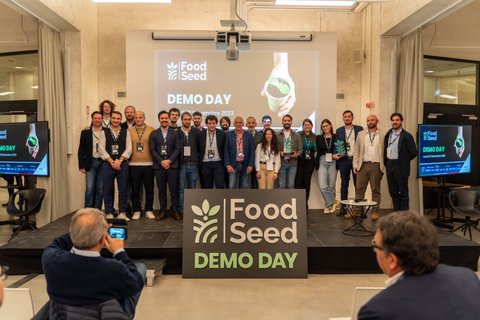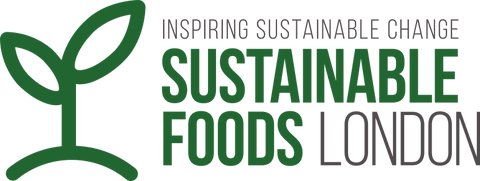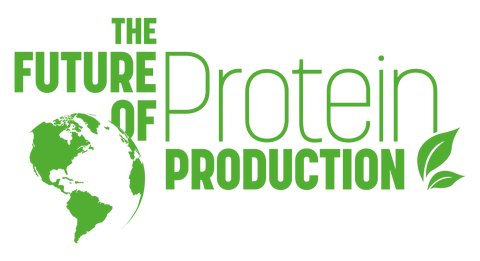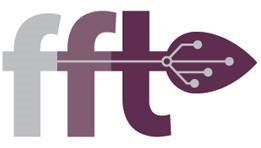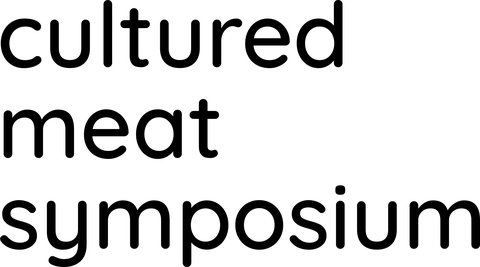FoodSeed Accelerator: Unveiling Seven 'Made in Italy' Startups Ready to Revolutionize the Italian Agri-Foodtech Sector
November 14, 2023 - 9 min read
From “chocolate that’s not chocolate” to water stress prevention systems, the FoodSeed accelerator, an initiative by CDP Venture Capital, Fondazione Cariverona, UniCredit, and Eatable Adventures, with the contribution of leading industry partners, introduces seven “Made in Italy” projects that prioritize sustainability, technology, and ethics.
Milan, November 14, 2023 – Seven Italian startups have been selected for the 1st edition of the FoodSeed Accelerator, a program focused on innovative food technologies, part of the CDP Venture Capital National Network. FoodSeed was launched in March 2023 to promote excellence and innovation in the Italian agri-food industry, with the support of promoting partners and co-investors such as Fondazione Cariverona, UniCredit and Eatable Adventures, among the main foodtech accelerators on a global scale, with the contribution of corporate partners Amadori, Cattolica Business Unit of Generali Italia, Axxelera, Veronafiere and the scientific partner University of Verona.
After screening over 250 applications, the 7 startups presented concrete solutions to the main challenges affecting the food industry, at a national and global scale. The projects, showcased on the Demoday on November 13th in Verona, are ready to bring to the market solutions with a strong positive impact on the Italian FoodTech and Agritech sectors: from “non-chocolate chocolate” to prevention systems against water stress, to advanced fermentation via sound waves and the creation of organic products capable of extending the shelf life of products.
Every startup received an initial investment of 170.000 euros - with the possibility of increasing up to 500.000 euros for the best performers - and benefited from a 6-month acceleration program to consolidate their business proposal.
FoodSeed also offered a coaching and mentoring program that supports startups in building relationships and networking from an Open Innovation perspective. This aims to foster collaboration between these new enterprises and existing traditional entities, making it easier for them to find investors who believe in the importance of innovation to address crucial sustainability challenges in the food sector, the beating heart of the Italian economy.
- 1. Foreverland: The chocolate of the future on Italian tables
Foreverland introduces a revolutionary, sustainable, and Made in Italy alternative to the market: chocolate without cocoa. In response to the challenges posed by deforestation, water stress, carbon emissions, CO2 consumption, and the exploitation of over 1.5 million children in the chocolate industry, Foreverland addresses this pressing issue with Freecao. This breakthrough in the confectionery sector uses carob, a legume typical of the Mediterranean region and one of Italy’s major producers. By leveraging reverse engineering, enzymatic treatments, and fermentation and roasting techniques, Freecao significantly reduces environmental and social impact, supporting our system, lessening the issues on cocoa cultivation, and aiding local businesses in the sector. Freecao achieves an 80% reduction in CO2 emissions and a 90% decrease in water consumption compared to traditional cocoa production. This alternative is free from the top 9 allergens, including milk and tree nuts, it is gluten-free, caffeine-free, and avoids the usage of artificial ingredients. Furthermore, it contains 50% less sugar than traditional milk chocolate, making it a healthier choice for consumers.
- 2. Enhancing pasture well-being: Regrowth and remote livestock monitoring
The lack of adequate tools for extensive livestock farming management and the inadequacy of available products have brought Regrowth to the forefront. Hailing directly from Teramo, Regrowth introduces a Precision Livestock Farming (PLF) tool for extensive production farms, allowing farmers to monitor their farms. Regrowth offers a system capable of reducing animal losses by approximately 60% through early disease identification. Concerned about pasture well-being? With specific protocols, Regrowth can detect overgrazing caused by poor herd and pasture management. Moreover, their protocols aim to stimulate increased soil biodiversity, CO2 sequestration, water retention, and much more. To facilitate communication about livestock management, Regrowth makes farm data transparent and protected by anti-tampering protocols. The Regrowth team is currently adapting its system for intensive farms to ensure optimized management and monitor animal well-being levels.
- 3. Water stress and water waste: Soonapse to the rescue
Amidst climate change, water waste, and the lack of innovative means to help farmers understand soil health, the agricultural sector seeks assistance. Soonapse, a startup based in Rome, has developed the first Decision Support System (DSS) specifically designed for IoT. This Dual AI system interprets climate change and provides forecasts with 99% accuracy, enabling farmers to optimize water usage and more. By combining contextual information with events (data collected from sensors, drones, and satellites) and predictions, Soonapse can predict water conditions in any soil/crop for the next 5 days. This involves Smart or Precision Irrigation, a predictive model that considers all crops, offering advice on the best cultivation based on seasonality. Currently, no technology guarantees this level of precision. With experience in the wine sector, Soonapse is extending its technologies to serve oenologists, allowing them to improve production quality through agricultural process control.
- 4. Ozonated oil for sustainable agriculture: Agreen Biosolutions
By 2030, Italian (National Action Plan) and European (from Farm to Fork) regulations will reduce the use of chemical pesticides by 50% and increase the agricultural area cultivated with biological tools by 60% compared to today. Unfortunately, the market lacks sufficient products capable of protecting plants and replicating common phytosanitary agents, both in terms of effectiveness and cost. The agricultural market, therefore, needs an alternative with the same efficacy and comparable costs. Directly from Udine, Agreen Biosolutions proposes a solution to aid the transition to more sustainable agriculture: ozonized oil with a variable concentration of ozone, to be applied in agricultural fields, ensuring a preventive and/or curative effect. This certified “tonic” oil, with biostimulant and phytosanitary effects, eliminates the use of chemical pesticides and provides significant cost savings for farmers. A uniquely valuable product capable of stimulating and protecting crops.
- 5. From farm to fork: Trusty advocating Product traceability transparency
To ensure transparency in the food supply chain, Trusty offers industrial traceability services in environmental, social, and corporate governance domains. The Pescara-based startup has developed a blockchain-based platform with a customizable dashboard for each industry. The system can integrate information from authorities and issue traceability certifications. Trusty follows the entire life cycle of food products, from Farm to Fork, providing reliable and accurate information to stakeholders about the origin, quality, and safety of products. The startup’s services align with certain regulations, such as the European Deforestation Free and Smart Label standards. A traceability system like this can address various issues related to food safety and monitor emissions of pollutants during production. Starting with long and complex supply chains such as Cocoa, coffee, and other tropical products, the startup can genuinely contribute to building trust between consumers and producers for a more sustainable food system.
- 6. Extending product shelf life: AgreeNET
Addressing food waste, a major issue in the food chain, safeguarding our raw materials, and supporting Italian exports that significantly contribute to the national GDP, AgreeNET proposes an innovative, biologically based, and biodegradable material for food packaging. AgreeNET has conceived a POD to insert into product packaging. Emitting natural substances normally produced by plants to protect against pathogens, the POD can extend the shelf life of products by up to 20 days, helping food producers resolve or mitigate the issue of food waste.
- 7. Advanced fermentation through sound waves
What if sound therapy could benefit the industrial sector? The idea comes directly from Perugia: Hypesound, the startup selected by the acceleration program, has developed So’Sweep, a device that reproduces sound waves for advanced fermentation. It can accelerate the growth of microorganisms, increasing production by up to 300%, thus reducing time and costs. Currently, Hypesound is focusing on optimizing algae production, especially Spirulina and Chlorella. Still, the technology’s applications extend to the entire biotechnology sector.
“The impact of new technologies in the agri-food supply chain can truly change this market, bringing innovation to various aspects, from sustainability in production processes to food chain management and issues related to diet-caused pathologies,” comments Stefano Molino, Senior Partner and Head of the Accelerator Fund at CDP Venture Capital. “The quality of the new companies selected for the first edition of the FoodSeed Accelerator—one of the 18 operational programs of the CDP Venture Capital National Accelerators Network—shows us how enormous the potential of this market is in Italy. Together with co-investors and Accelerator partners, we will continue to monitor the growth of these entities.”
“We are convinced that supporting innovation is the only path to address global challenges that have very concrete repercussions on our territories, from the climate crisis to food insecurity. Startups will contribute to developing solutions capable of ensuring a future for our planet. The program also provides an opportunity for young people to play a leading role, helping them transform their projects into products and services, benefiting the entire community. As a Foundation, we want to create the right conditions for new ideas to find space and be realized, not only by providing economic resources but also by building strategic alliances, fostering the development of new skills, and encouraging the sharing of best practices,” comments Filippo Manfredi, General Manager of Fondazione Cariverona.
Francesco Iannella, Northeast Regional Manager at UniCredit, states: “The FoodSeed proposal has received a widely positive response, as evidenced by the high number of applications received. We believe that this initiative strongly desired and supported by us along with our partners, is yet another concrete demonstration of UniCredit’s attention to the communities in which it operates. It reflects our commitment to providing them, through the enhancement of specificities, with all the necessary tools to trigger virtuous cycles with positive repercussions for the entire territory.”
“We are proud to be able to support these and future initiatives, bringing the know-how of Eatable Adventures to Italy in support of the national entrepreneurial ecosystem,” declares Alberto Barbari, Program Director of Eatable Adventures for FoodSeed. “Open Innovation, synergy between tradition and innovation, technological ethics, and of course, a love for good food – these are the key elements that will give life to new enhanced business models, ready to provide effective momentum to the sector and the entire Italian economy of tomorrow. All of this is in favor of a culture of development linked to a careful, sustainable, and democratic use of new technologies.”
The acceleration program has also had a strong resonance in the rest of Europe, especially in those countries where the food sector already collaborates with industry innovation: 5% of the received applications come from Spain, France, Germany, Great Britain, and Switzerland. This data not only is unsurprising but further validates the inclusive nature of FoodSeed and emphasizes the general interest in safeguarding Italy’s role as a gastronomic excellence worldwide. An acceleration program capable of attracting new talents that can bring a breath of innovation to a sector that, although excellent, remains deeply rooted in tradition.
FoodSeed will select, every year, for three consecutive years, up to 10 startups capable of building ecosystems and value synergies that bring innovation to the entire sector for a more sustainable Italy. The call for startups participating in the 2nd edition of FoodSeed will open in February 2024.
